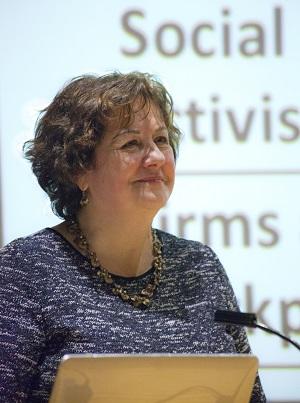A Leaking Pipeline for International Studies
 As always, our Center has been bustling with activity as the academic year ends. In the first week of April, we cosponsored the Harvard Summit for Gender Equity and hosted an amazing Jodidi Lecture delivered by 2018 Nobel Peace Prize Laureate Nadia Murad. We also cosponsored an important event on the global Roma diaspora for International Roma Day.
As always, our Center has been bustling with activity as the academic year ends. In the first week of April, we cosponsored the Harvard Summit for Gender Equity and hosted an amazing Jodidi Lecture delivered by 2018 Nobel Peace Prize Laureate Nadia Murad. We also cosponsored an important event on the global Roma diaspora for International Roma Day.
Beyond our campus, the world of international studies faces some new and important challenges. A recent study by the Modern Language Association (MLA) found that between fall 2013 and fall 2016, US college enrollments in languages other than English fell 9.2 percent. In concrete terms, this means that colleges lost an astounding 651 foreign-language programs in three years. A decline in the number of language learners portends a leaking academic pipeline that will affect our country’s ability to sustain real expertise in international, comparative, transnational, and global studies in the decades ahead. This is particularly worrisome when growing global integration should lead us to prioritize resisting isolationism.
At Harvard, the trends in language enrollment vary. European languages fare badly: French, German, and Spanish language enrollments declined similarly during this time period. Yet East Asian (especially Chinese), Russian, and Arabic language enrollments increased somewhat. As such, we are experiencing more of a shift in the population of students studying languages rather than an overall drop in their numbers.
However, there is a real area of concern: some Harvard undergraduates still want to do research, and more prefer to stay on campus to do so. This is negatively affecting the number of applicants who plan to do field work abroad—for a senior thesis or other purpose.
What can we do to encourage student interest in international research opportunities? Language ability is obviously an important prerequisite for such an experience. Optimistic Harvard undergraduates sometimes imagine they can hire a translator or pick up sufficient language skills on the fly. However, there is no preparatory substitute for intensive, term-time, classroom-based language study in readying students to conduct independent research abroad.
Thus, starting this summer, the Weatherhead Center is committing additional resources to support early career language study—doubling our investment in this category of funding. We are also increasing our support for undergraduate field studies—funding almost half of the applications we received for summer research this year. Additionally, we are bolstering our support to graduate student research by funding over a third of our early-stage graduate student applications and increasing support for dissertation writing.
Fostering international studies is an urgent task as many senior scholars are retiring. We want to continue producing the deep knowledge of various parts of the world that will propel our societies forward. The Weatherhead Center already contributes mightily to this effort, and we hope to do more in the future.
In other news, I wish to share with the WCFIA community my plans for the next academic year: as of fall 2019, I become an empty nester with our twins heading off to college (one to Reed College, and the other to Harvard). I will be on sabbatical leave in Manhattan, with the support of an Andrew Carnegie Fellowship and a fellowship from the Russell Sage Foundation, where I will be in residence. I plan to work on a book tentatively titled New Narratives of Hope: Self-Worth and the Current Crisis of American Society, which will discuss the current cultural landscape of the United States against the background of other advanced industrial societies. This book will tie together social changes and the need to engineer new collective myths and repertoires of hope.
While I am away, Melani Cammett, Clarence Dillon Professor of International Affairs at Harvard University and professor of global health and population at Harvard T.H. Chan School of Public Health, will serve as acting director for the Center while she also leads The Harvard Academy (which is part of the WCFIA). Our Center will be in excellent hands, with the able support of Ted Gilman and the WCFIA team.
Warm thanks to our faculty, whose participation in committees and intellectual engagement adds great value to the Center’s community. Thank you also to our amazing staff for all they do to support our Center’s mission. I wish everyone an excellent summer and look forward to reconnecting with the WCFIA community in the fall of 2020, deo volente! Arrivederci!
Michèle Lamont
Weatherhead Center Director
Photo credit: Dave Nelson
